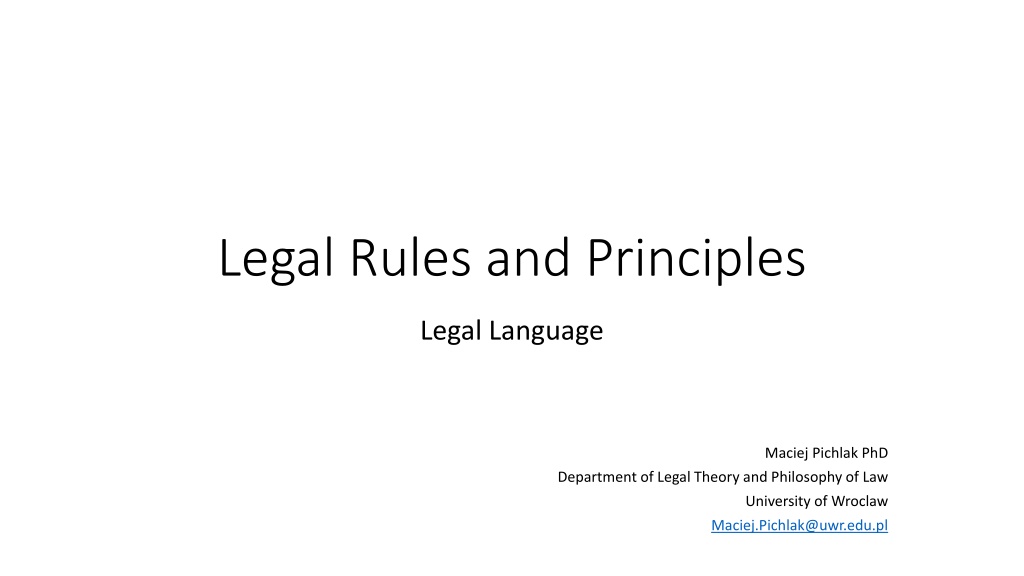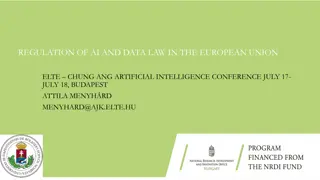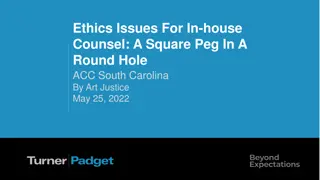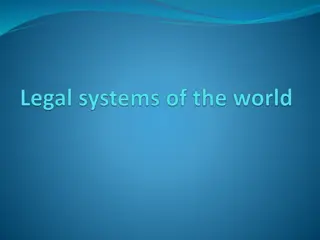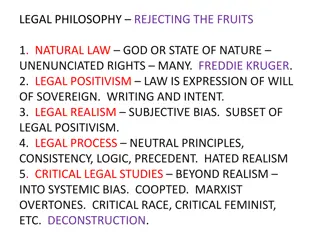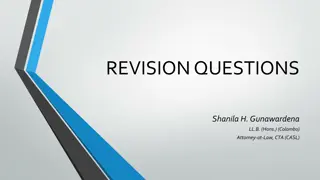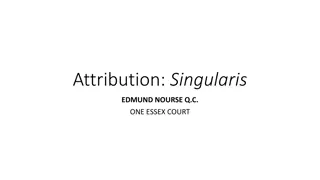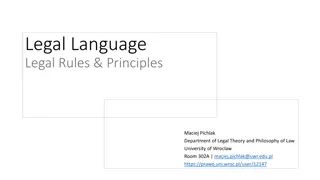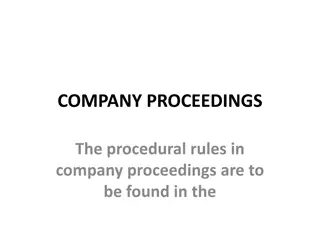Legal Rules and Principles: An Insight into Norms and Case Studies
Explore the intricacies of legal rules and principles, including the structure of norms, components, addressees, and an intriguing case study of Riggs v. Palmer. Delve into the unique concept of personhood granted to natural features like lands and rivers in New Zealand, challenging traditional legal paradigms.
Download Presentation

Please find below an Image/Link to download the presentation.
The content on the website is provided AS IS for your information and personal use only. It may not be sold, licensed, or shared on other websites without obtaining consent from the author. Download presentation by click this link. If you encounter any issues during the download, it is possible that the publisher has removed the file from their server.
E N D
Presentation Transcript
Legal Rules and Principles Legal Language Maciej Pichlak PhD Department of Legal Theory and Philosophy of Law University of Wroclaw Maciej.Pichlak@uwr.edu.pl
Structure of a norm Hypothesis scope of circumstances (situations) in which the norm shall be applied Disposition scope of conducts which are ordered, prohibited or allowed by the norm
Structure of a norm Three necessary components: Hypothesis Addressee A defendant who is represented by a lawyer may plead not guilty or enter a special plea by filing a notice in court. Disposition (Criminal Procedure Act of New Zealand)
Structure of a norm Addressee: the subject to whom the norm is addressed physical person (private individual) legal person (corporate body) organization unit that lacks legal personality (eg. administrative agency, private partnership) On the edge: Bots? Animals? Natural areas? https://www.theguardian.com/technology/2014/dec/05/software-bot-darknet-shopping-spree-random-shopper
Can a stretch of land be a person in the eyes of the law? Can a body of water? In New Zealand, they can. A former national park has been granted personhood, and a river system is expected to receive the same soon. The unusual designations, something like the legal status that corporations possess, came out of agreements between New Zealand s government and Maori groups. The two sides have argued for years over guardianship of the country s natural features. Chris Finlayson, New Zealand s attorney general, said the issue was resolved by taking the Maori mind-set into account. In their worldview, I am the river and the river is me, he said. Their geographic region is part and parcel of who they are. From 1954 to 2014, Te Urewera was an 821-square-mile national park on the North Island, but when the Te Urewera Act took effect, the government gave up formal ownership, and the land became a legal entity with all the rights, powers, duties and liabilities of a legal person, as the statute puts it. https://www.nytimes.com/2016/07/14/world/what- in-the-world/in-new-zealand-lands-and-rivers-can- be-people-legally-speaking.html
Principles: case study Riggs v. Palmer, 22 N.E. 188 (N.Y. 1889) In Riggs, a probate suit, the plaintiffs, Mrs. Riggs and Mrs. Preston, sought to invalidate the will of their father Francis B. Palmer; testated on August 13, 1880. The defendant in the case was Elmer E. Palmer, grandson to the testator. The will gave small legacies to two of the daughters, Mrs. Preston and Mrs. Riggs, and the bulk of the estate to Elmer Palmer to be cared for by his mother, Susan Palmer, the widow of a dead son of the testator, until he became of legal age. Knowing that he was to be the recipient of his grandfather's large estate, Elmer, fearing that his grandfather might change the will, murdered his grandfather by poisoning him. The plaintiffs argued that by allowing the will to be executed Elmer would be profiting from his crime. While a criminal law existed to punish Elmer for the murder, there was no statute under either probate or criminal law that invalidated his claim to the estate based on his role in the murder.
Riggs vs. Palmer 'No one should be permitted to take advantage of his own wrong Justice Earl s opinion: Besides, all laws as well as all contracts may be controlled in their operation and effect by general, fundamental maxims of the common law. No one shall be permitted to profit by his own fraud, or to take advantage of his own wrong, or to found any claim upon his own iniquity, or to acquire property by his own crime. These maxims are dictated by public policy, have their foundation in universal law administered in all civilized countries, and have nowhere been superseded by statutes. They were applied in the decision of the case of the New York Mutual Life Insurance Company v. Armstrong (117 U. S. 591).
Legal principles: a concept Legal rules of special relevance for: the whole legal system; the branch of a legal system (e.g. civil law, criminal law); particular lawmaking instrument; particular legal institution.
Three basic types of principles 1. Explicitly formulated in legal text 2. Reconstructed from other rules (background idea) 3. Independent from legal text
Explicit The Republic of Poland shall be a democratic state ruled by law and implementing the principles of social justice. (Constitution of RP, Art. 2) Everyone charged with a criminal offence shall have the right to be presumed innocent until proved guilty according to the law. (International Covenant of Civil and Political Rights, Art. 14)
EU - explicit Those who act in good faith on the basis of law as it is or seems to be should not be frustrated in their expectations . [Legal certainty] Any action by the Community shall not go beyond what is necessary to achieve the objectives of this Treaty . [Proportionality]
Reconstructed Reconstructed from a set of particular rules (procedure of induction?). Models for shaping legal institutions. Eg.: Equality of parties in civil law General principles of EU law (proportionality, subsidiarity, fundamental rights etc.)
EU: reconstructed Respect for fundamental rights form an integral part of the general principles of law protected by the Court of Justice [of European Union]. The protection of such rights, whilst inspired by the constitutional traditions common to the member states, must be ensured within the framework of the structure and objectives of the Community . International Handelsgesellschaft v Einfuhr- und Vorratsstelle Getreide [1970] ECR 1125 Case 11/70
Independent Justice Earl: Fundamental maxims [ ] dictated by public policy, [which] have their foundation in universal law administered in all civilized countries, and have nowhere been superseded by statutes . They form an institutional morality . They are binding due to material significance and institutional acceptance . (Ronald Dworkin)
EU: independent The Community constitutes a new legal order of international law for the benefit of which the states have limited their sovereign rights, albeit within limited fields and the subjects of which comprise not only member states but also their nationals. Independently of the legislation of member states, community law therefore not only imposes obligations on individuals but is also intended to confer upon them rights which become part of their legal heritage . Van Gend en Loos (1963) Case 26/62: The principle of direct effect
Principles vs. rules 'NORMAL' RULES PRINCIPLES Imprecise scope of application Less or more fashion of application Solving collisions in each particular case; both principles binding Precise scope of application All or nothing fashion of appl. Abstract and abrogative mode of solving collisions
Collision between principles Criminal Procedure : The principle of objective truth The principle of swiftness of procedure (reasonable term) Neccessity of weighing
Application of principles Three basic situations: Principle supports interpretation of rules Principle used when there is no rule (lacuna) Collision between a principle and a rule
Application of principles Dworkin's thesis (common law): Principles are inconclusive, still they can be efficient legal ground for decision. Alexy's thesis (statutory law): Principles have optimising character and give directives for interpretation of typical rules.
